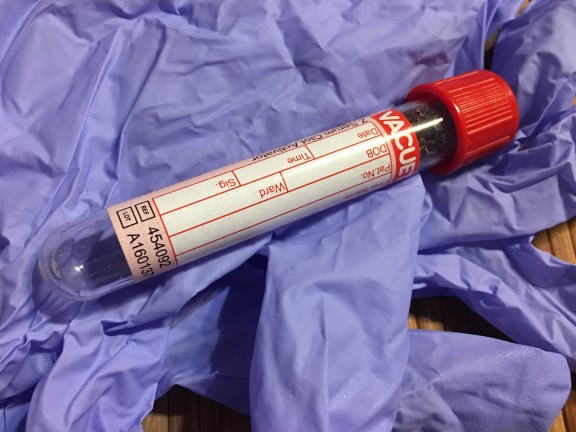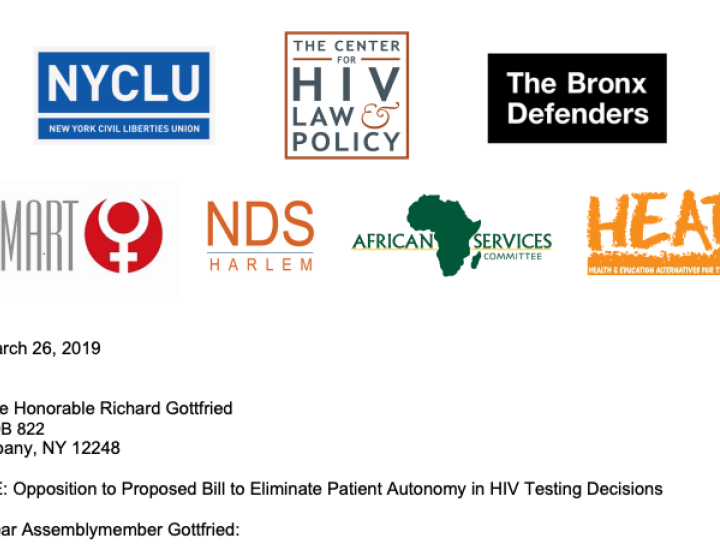CHLP's Op-Ed on the Problems with Eliminating Routine Notice and Consent Before HIV Testing

Since mid-2018, several members of New York’s EtE (Ending the Epidemic) committee have been quietly pushing a proposal to eliminate the last remaining part of HIV testing that treats it the way most testing for serious or sexually transmitted diseases is conducted. Drafts of a proposed bill (not yet introduced) would reduce notice and consent to a sign on the wall of a clinic or ER.
CHLP and a number of other advocates* have been pushing back against this proposal, pointing out that New York law already requires everyone to be offered an HIV test, and that there is zero evidence that eliminating the requirement that a health care provider actually speak with someone before testing them will do anything to improve the engagement in care and prevention of new infections the EtE campaign was created to achieve.
On May 18, the NY Post featured an op-ed authored by CHLP Staff Attorney Jacob Schneider and Dr. Jeffrey Birnbaum, a physician at State University of New York Downstate Medical Center. Jake and Jeff outline just a few of the reasons why the “no notice” proposal is bad for people at risk of HIV.
If we care about preventing HIV as much as we do about testing for HIV, and if we believe that people at highest risk are not getting tested, why the push for a policy that makes it even easier for health care providers not to talk with people about HIV? The plan to End the Epidemic has three major prongs, one of which is to facilitate access to Pre-Exposure Prophylaxis (PrEP) to keep people at risk from acquiring HIV. If health care providers don’t talk with patients about HIV while drawing their blood, what are the odds that they’ll mention the availability of PrEP to those at risk who do not test positive, to prevent new HIV infections in the first place?
It is puzzling that so many people continue to think that the more rights a person has with relation to their health care choices, the more barriers there are to getting them tested and in care. In New York, that belief has reached the point where some now want to enshrine in the law a lower standard of care for those at risk of HIV than for pretty much everyone else.
We think that’s unacceptable. Please read Jake and Jeff’s op-ed. If you agree, let your health department and state representatives know, whether in New York or in any state where this kind of bad idea gets on the policy agenda.
* In addition to CHLP, this coalition includes the New York Civil Liberties Union, The Bronx Defenders, Neighborhood Defender Service of Harlem, African Services Committee, Health and Education Alternatives for Teens, Immigration Equality, and Sisterhood Mobilized for AIDS/HIV Research and Treatment, as well as individual activists and medical providers William Dobbs, Esq., Cynthia B. Knox, Esq., and Neal Rzepkowski, MD.
___
OPINION
The wrong way to ‘improve’ HIV testing
By Jacob Schneider and Jeffrey Birnbaum
May 17, 2019
Click to view this article in the NY Post.
You walk into an emergency room with severe pain. A hospital worker draws your blood. Sometime later, a doctor tells you in the crowded ER that you have HIV. But why? It’s unrelated to what brought you to the hospital, and no one even mentioned that they would be testing you for HIV.
This unsettling scenario will become routine if a proposed modification of New York’s HIV-testing statute becomes law.
Is testing everyone for HIV without their knowledge more important than letting people choose whether and when to get tested?
A small group of large organizations and medical facilities appear to think so and want lawmakers to eliminate the notice and discussion that is routine when a doctor sees someone at risk for a serious disease.
With the goal of getting all New Yorkers tested for HIV, some advocates are pushing an aggressive change in the law to permit testing without any notice to the patient beyond a sign on the clinic wall. They argue that more patients will be tested if doctors are not required to discuss the test first, which many doctors avoid doing because they find it uncomfortable.
But we already have legal tools to increase the rate of HIV testing — if only the state would enforce them. And changing the law to take control away from patients could have disastrous consequences and erode trust in our health care system.
New York law currently requires that doctors offer HIV “opt-out” testing to virtually everyone — meaning that patients have to object to avoid testing, a process that already involves less patient engagement than is routinely provided when people test for other sexually transmitted diseases, such as syphilis, herpes or gonorrhea, diseases that can cause severe health problems if left undiagnosed and untreated.
Rather than enforce that law, which many doctors are not following, the proposal would let doctors who avoid uncomfortable conversations about sex and HIV off the hook by curtailing patient rights to make testing decisions for themselves.
Dispensing with that conversation ignores the needs of patients who do not read, or don’t read English, or have a condition or disability that makes notice-by-signage equivalent to mandatory testing.
Many people have legitimate concerns about when and where they are tested. The immigrant with a pending asylum claim may be concerned that testing at a public hospital might result in the disclosure of sensitive information to federal enforcement authorities.
Many people might prefer to discuss a sensitive diagnosis with their personal physician than with a stranger in a crowded, noisy ER.
And taking away the basic right to decide when, where or whether you receive care risks further alienating patient populations that already mistrust our health care system.
Decades ago, the medical profession shifted from the “doctor knows best” thinking of the 19th century to today’s patient-centered approach. The concept of informed consent is so important to modern medical care that it is embedded in the ethical standards of the American Medical Association and the American Nurses Association as well as New York’s Patients’ Bill of Rights.
Now is not the moment to turn back on that important principle.
Instead, we should focus on understanding where and why people currently fall through the cracks in our health care system. The state should enforce current testing law before letting doctors who ignore it off the hook and putting a tacit seal of approval on a substandard level of care.
We also need to understand why some patients decline HIV testing, and the effect of HIV stigma and discrimination on their decision. Health and Human Services Secretary Alex Azar recently identified HIV stigma as one of the two top challenges in the federal plan to end HIV transmission by 2030. Our public health policy should address that issue through engagement, not avoidance.
Ending HIV in New York needs shared commitment and resources, not desperate policy changes unsupported by evidence and unlikely to succeed.
Jacob Schneider is a staff attorney at the Center for HIV Law and Policy. Jeffrey Birnbaum is a physician at State University of New York Downstate Medical Center.
